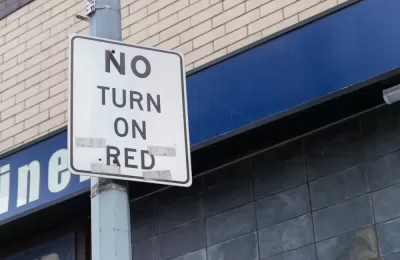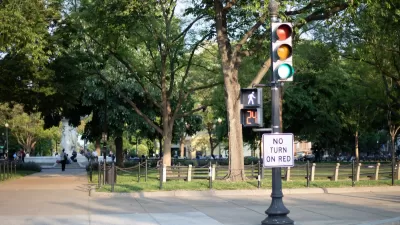How road safety activists passed a law that could make roads much safer.

In a piece for the Vision Zero Cities Journal republished in Streetsblog USA, Rebecca Serna and Jason Dozier outline how Atlanta, Georgia passed a ban on right turns on red this February in an effort to make streets in three central neighborhoods safer for pedestrians.
As the authors explain, “Research shows that turning right on red poses significant risks to people who are most vulnerable in crashes: people getting around by foot, wheelchair, and bicycle. As drivers make right turns on red lights, their attention is focused on oncoming traffic from their left — not on people walking across the street or waiting in the bike lane on their right. With their attention elsewhere, drivers are more likely to turn into people outside of cars who have the pedestrian signal to cross.”
Planetizen has covered right turns on red in previous pieces, noting that allowing right turns on red lights was largely a result of the 1970s energy crisis. However, transportation planners and policymakers are now recognizing its negative impact on road safety and working to reverse the laws that allows these turns.
In Atlanta, 65 fatalities and serious injuries occurred at intersections with legal right turns on red in the last nine years, with close to half of them happening while drivers were turning right at red lights. The effort to ban them was led by city council member Jason S. Dozier, who urged fellow council members — some of whom have experienced close calls as pedestrians themselves — to support the ban. “In an unexpected turn, we also found allies in councilmembers who drove some of the largest vehicles, who supported the effort due to near-misses they’d experienced with pedestrians.”
According to the authors, “Atlanta’s new no-right-on-red policy is a step towards real, measurable change in pedestrian safety. It’s also a chance to live out our declared values as a city that is both pedestrian-friendly and supportive of sustainable and safe ways of getting around.”
FULL STORY: How Atlanta Passed Its Right-On-Red Ban

Planetizen Federal Action Tracker
A weekly monitor of how Trump’s orders and actions are impacting planners and planning in America.

Maui's Vacation Rental Debate Turns Ugly
Verbal attacks, misinformation campaigns and fistfights plague a high-stakes debate to convert thousands of vacation rentals into long-term housing.

San Francisco Suspends Traffic Calming Amidst Record Deaths
Citing “a challenging fiscal landscape,” the city will cease the program on the heels of 42 traffic deaths, including 24 pedestrians.

Amtrak Rolls Out New Orleans to Alabama “Mardi Gras” Train
The new service will operate morning and evening departures between Mobile and New Orleans.

The Subversive Car-Free Guide to Trump's Great American Road Trip
Car-free ways to access Chicagoland’s best tourist attractions.

San Antonio and Austin are Fusing Into one Massive Megaregion
The region spanning the two central Texas cities is growing fast, posing challenges for local infrastructure and water supplies.
Urban Design for Planners 1: Software Tools
This six-course series explores essential urban design concepts using open source software and equips planners with the tools they need to participate fully in the urban design process.
Planning for Universal Design
Learn the tools for implementing Universal Design in planning regulations.
Heyer Gruel & Associates PA
JM Goldson LLC
Custer County Colorado
City of Camden Redevelopment Agency
City of Astoria
Transportation Research & Education Center (TREC) at Portland State University
Jefferson Parish Government
Camden Redevelopment Agency
City of Claremont





























